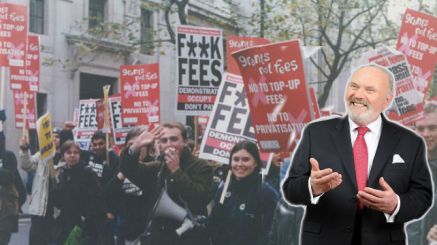Senator David Norris Tells CollegeTimes Why Student Protest Is So Important

Young people cannot be underestimated in today's political and social climate. DIT, DCU, UCD and many other college students were among the marchers during International Women's Day, protesting for women to have control over their own reproductive rights. In recent days TCD students occupied Trinity College to prevent the introduction of €450 resit exam fees, an impossible price for a student budget.
Unlike the riots that took place in Berkley in 2017 when right-wing "online troll", Milo Yiannopoulos, tried to speak on campus, the students of Trinity are working together to create a movement and campaign built on a collective student body whose ethos does not incite violence or rioting. Today students are sitting outside the Berkley library protesting for their fellow students and trying to catch up on their studies, a testament to their commitment to both their studies and what is right:
students studying peacefully outside the berkeley library as part of today’s #TakeBackTrinity direct action pic.twitter.com/fbMKpbC3UO
— TCD Students' Union (@tcdsu) March 23, 2018
One person who understands the importance of student protest is Senator David Norris, a powerful figure in the campaign to decriminalize homosexuality in the 1990s. When it comes to protesting Norris insists it's crucial to highlight political and social changes as they unfold in the world around us. Norris believes that today's students and youth are less likely to protest than previous generations: "...I think students and young people are less likely to protest nowadays but then I was a student in the 1960s which were noted for student radicalism and protest. I think these things go in cycles". Are students less likely to stand up for what they believe in or has protest left the streets and turned online in the digital age?
Activism and protest have changed. Online activism has proven to be the go-to for countless young people choosing to voice their concerns through hashtags, Instagram stories, and polls. As commendable as that action is, it's the everyday people who collectively come together in the form of protest that creates anxiety and apprehension for the elites. The recent campaign by Trinity students to stop the introduction of additional fees for resit or repeat exams is one movement we should all be taking note of.
Firstly the students, in their droves, posted dismal reviews about Trinity College Dublin on Facebook and Google causing the university to hide unflattering reviews from the public for the foreseeable future. Not content with merely voicing their dissatisfaction online however, the protestors then turned their sights to the prestigious and tourist hotspot the Book of Kells - a significant source of income for the university, Finally the students occupied Trinity's dining hall for three days and turned their valiant efforts into an outdoor concert.
A protest is not just an opportunity to chant, but a powerful tool that can force complacent institutes to change and spur on a generation. The protestors voice spreads knowledge and awareness to local communities all the while reasserting the Francis Bacon quote "knowledge is power". As a key figure in the Marriage Equality campaign, Norris is reminded of how liberating and exciting it is to achieve change through campaigning and direct action:
What stands out for me especially from the day of the Marriage Referendum was 9.15 a.m. in the RDS I was watching the opening of the boxes and after 15 minutes I could tell that we had won. I was thrilled because I hadn't been certain until that time. The other matter was walking back from Dublin Castle through Capel Street with all the crowds celebrating.
When it comes to debating the big issues such as Repeal, Senator Norris understands this can be difficult with older people and a source of anxiety for younger generations: "First of all respect the right of your elders to have different opinions but try to discuss matters with them and continue to be passionate". How do we get more people involved in protest and campaigning? Norris believes that we need the best examples of public service and by everyone getting out and getting involved:
...by encouraging schools to engage in civics classes... Ireland is a small country for protests and marches and so on, it's not that difficult for people to come from any part of Ireland to Dublin and I think this is also a good way of meeting people.
Although protest helps to push matters of equality, the Marriage referendum being a significant example, it's a reminder that there's still much work to do. I asked Senator Norris about what's left to achieve, specifically in the case of protecting our LGBTQ brethren, and it's the young people across the country that Norris is concerned about:
After the Marriage Referendum there still are a few small or not so small issues to be tidied up and the first is a small number of tax anomalies that affect gay people and the government really should clear this matter decisively. The other is more dispersed and difficult to deal with and that is the difficulties of young people around the country who are still being bullied over issues of sexuality.
Millenials and Generation Y aren't the sniffling snowflakes that so many claim. Collectively these young adults have the capacity and power to change Ireland and whether that's a good or bad thing is entirely open to opinion.